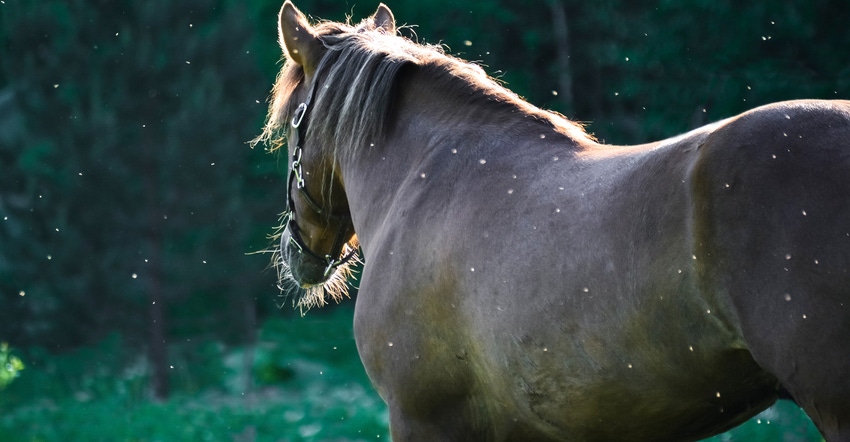August 24, 2020

Nora Wineland, Michigan Department of Agriculture and Rural Development state veterinarian, has recently confirmed the second case of Eastern equine encephalitis for 2020 in a 12-year-old mare from Montcalm County. The discovery of this second case intensifies the need for both horse owners and Michigan residents to take precautions.
EEE is a zoonotic, viral disease, transmitted by mosquitoes to both animals and people. EEE is one of the most dangerous mosquito-borne diseases in the U.S., and the virus is typically seen in late summer to early fall each year in Michigan.
While horses are highly affected by the disease, people also can be infected with EEE from the bite of a mosquito carrying the virus. In humans, signs of EEE include the sudden onset of fever, chills, and body and joint aches. EEE infection can develop into severe encephalitis, resulting in headache, disorientation, tremors, seizures and paralysis. Permanent brain damage, coma and death also may occur in some cases.
“This second confirmed case of EEE in a horse reminds Michiganders of the strong need to take precautions to protect themselves from mosquito bites,” says Dr. Joneigh Khaldun, chief medical executive and chief deputy director for health for the Michigan Department of Health and Human Services. “It only takes one bite from a mosquito to transmit the virus, which can lead to severe neurologic illness, permanent disability and sometimes death.”
Protect animals
To protect your horses and other domestic animals (such as dogs, sheep and goats), measures could include the following:
Talk to a veterinarian about vaccinating horses against EEE.
Place livestock in a barn under fans (as mosquitos are not strong flyers) during peak mosquito activity from dusk to dawn.
Use an insect repellant that is approved for the species.
Eliminate standing water on the property — fill in puddles, repair eaves and change the water in buckets and bowls at least once a day.
Contact a veterinarian if an animal shows signs of the illness: fever and stumbling.
Protect people
To protect yourself and your family, here’s what you should do now:
Use repellents. Apply insect repellents that contain the active ingredient DEET, or other EPA-approved products, to exposed skin or clothing and always follow the manufacturer’s directions for use.
Cover up. Wear long-sleeved shirts and long pants when outdoors. Apply insect repellent to clothing to help prevent bites.
Close windows. Maintain windows and door screenings to help keep mosquitoes outside.
Eliminate standing water. Empty water from mosquito breeding sites around the home, such as buckets, unused children’s pools, old tires or similar sites where mosquitoes may lay eggs.
Use nets and fans. Use nets or fans over outdoor eating areas.
Mosquito-borne illnesses, such as EEE, will continue to pose a risk to both animals and humans until late fall when nighttime temperatures consistently fall below freezing.
For more information about mosquito-borne diseases, visit Michigan.gov/emergingdiseases.
Source: MDARD, which is solely responsible for the information provided and is wholly owned by the source. Informa Business Media and all its subsidiaries are not responsible for any of the content contained in this information asset.
You May Also Like




